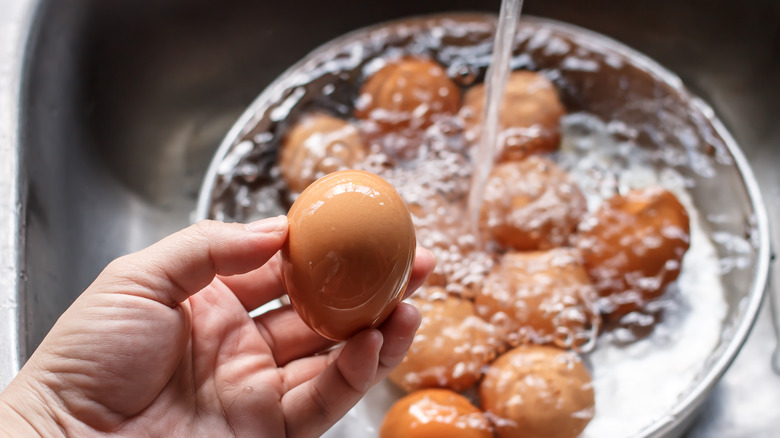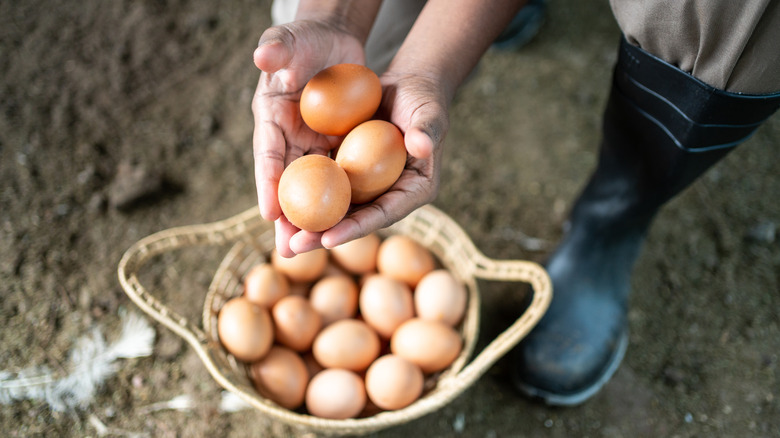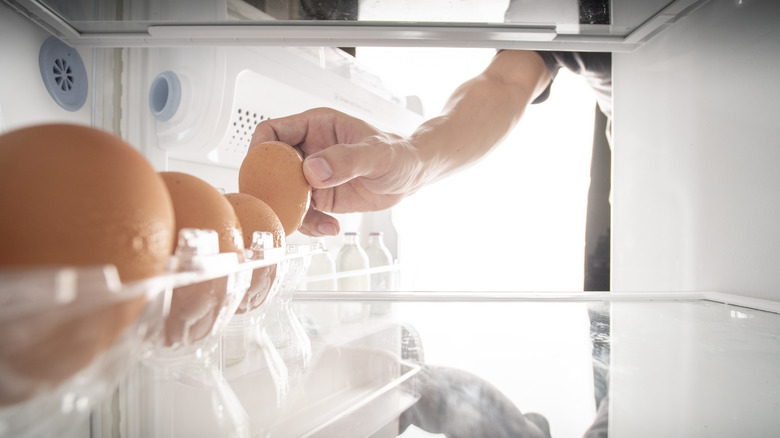Should You Wash Eggs Before Cooking Them? The USDA Explains
It's almost instinctive: the desire to hold something under the tap at the kitchen sink before you cook it or consume it. The logic in your mind is that you're cleaning the product before eating it. But what is the deal with eggs? Should you wash them before you crack open the shell, empty its contents, and proceed to make yourself some breakfast? It turns out that cleaning them the right way involves knowing the distinction between store-bought eggs and farm-fresh ones, plus understanding how they're produced, packaged, and stored.
According to the USDA, you don't have to wash store-bought eggs before consuming them. In fact, washing them might increase the risk of contamination. The shells of eggs are actually porous (to make room for oxygen to enter the egg) and come with a protective coating called a "cuticle" or "bloom" when they are first laid by a hen. The cuticle's purpose is to keep harmful bacteria from entering the egg. During the commercial processing of an egg, this protective layer is washed off and replaced with edible mineral oil that acts as a protective coating, says the USDA.
Holistic health expert and author Amy Leigh Mercree further explained to Reader's Digest, "If you wash an egg before you cook it, because its shell is porous, the water ... can push bacteria into the egg." So, the healthiest way to eat store-bought eggs is to avoid washing them.
What about farm-fresh eggs?
Marisa Bunning, a professor and food safety extension specialist in the Department of Food Science and Human Nutrition at Colorado State University, told Real Simple that farm-fresh eggs are a different story from store-bought, prettily packaged cartons of eggs. "Consumers aren't used to eggs from their backyard. They're treating them like they're the same, but they're not the same," she shared.
The main difference lies in the fact that store-bought eggs have already gone through a thorough cleaning and packaging process, as explained before. Farm-fresh eggs could have dirt, debris, straw, and even droppings on the shells, said Bunning. The natural cuticle that encircles an egg when it's first laid can actually keep eggs fresh on the counter for weeks, per Taste of Home. But as soon as you wash them, the coating is removed, making the eggs vulnerable to contamination. So as a rule of thumb, it's best to wash farm-fresh eggs just before you consume them.
When it comes to washing backyard eggs, it's also important to note that you shouldn't leave them sitting in water where dirt and debris mixed with water can enter the egg through its porous shell. Instead, wash the eggs under running water that's between 110 and 120 degrees Fahrenheit, per Colorado State University. You can use unscented dishwashing liquid if you want some extra cleanliness.
How to store eggs
Different countries may have different rules about washing and storing eggs; but Bunning shared that, in the U.S., store-bought eggs are best left in their original cartons and placed in the refrigerator for storage. The coldest part of the refrigerator is best — 40 degrees Fahrenheit or below, according to the USDA. If you're cooking eggs for a meal, make sure they don't sit outside of the fridge for more than two hours.
Farm-fresh eggs can also go in the refrigerator until you're ready to consume them, although, it's also safe to leave the natural cuticle-protected produce sitting on a counter for two weeks. When you're ready to consume the eggs, remove them from the refrigerator and quickly wash the egg with water that's warmer than the egg. You can use a gentle brush to remove any dirt that's stuck to the shell as well. While you can refrigerate farm-fresh washed eggs, most experts would recommend only washing them before eating them to avoid the risk of cross-contamination.


